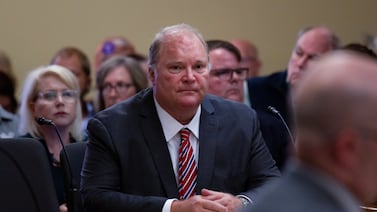Votebeat is a nonprofit news organization reporting on voting access and election administration across the U.S. Sign up for Votebeat Texas’ free newsletter here.
Texans will have a new schedule for early voting in coming years under new legislation that starts the voting period later but slides it right up to Election Day, eliminating the three-day break in between.
Experts say Senate Bill 2753, which lawmakers approved this week, will likely boost turnout, as it includes more time for voting on weekends. The author of the bill, Sen. Bob Hall, a Republican from North Texas, told Votebeat that the change also “simplifies the process” and would reduce the cost of election operations and equipment.
But local election officials said they aren’t so sure of that, and are still determining how it will work and what it could cost counties. The bill doesn’t allocate any funding for counties to implement the changes.
And there’s one notable side effect of taking away the gap after the early-voting period: Partial vote tallies from the early ballots, which are typically released shortly after polls close on Election Day, won’t be available until later, election administrators said.
The bill is headed to Gov. Greg Abbott’s desk for his signature, though it can become law without it.
The changes have to go into effect no later than August 2027. Some election officials warned that they are likely to need additional election workers to work longer hours to comply with the requirements, as well as more voting equipment and possibly additional polling locations.
“These are just things that we don’t know yet because we haven’t run an election in this model yet,” said Jennifer Doinoff, Hays County elections administrator and the legislative committee chair for the Texas Association of County Election Officials. “It’s something we’re going to have to look at and build from the ground up.”
It’s not yet clear when counties would begin implementing the changes. The bill directs the Texas secretary of state to adopt rules and procedures to implement the new timeline and provide a report telling the Texas Legislature “as soon as practicable” after Sept. 1 that the agency “has consulted with county election officials and is confident that the counties in this state are prepared.”
Also, the Legislature could make changes based on the secretary of state’s report, because there is a full regular legislative session in 2027 before SB 2753’s new early voting timeline has to be used.
How the legislation changes early voting
Currently, during general elections that have county and state offices on the ballot, Texas offers 12 days of early voting, starting the 17th day before Election Day and ending four days before Election Day. This allows for only a single weekend of voting.
The new law would also require 12 days of early voting, but the period would begin on a Thursday and run for 12 days straight, including two weekends, right up to Election Day. In addition, Sunday voting hours would be extended from six to nine hours a day, and early voting would also be available on any holidays during that period.
While the number of days doesn’t change, election officials said the new schedule will eliminate a treasured break for workers before Election Day, and they worry they’ll lose workers without it. Some officials also said it can be hard to find people to work Sundays.
In Collin County, the early-voting staffers typically also work on Election Day, said Kaleb Breaux, the county’s elections administrator.
“It’s a laborious process for them, just mentally and physically,” Breaux said. “By the time they get to that last week of early voting, they’re just worn out.”
Election offices also used the break to set up equipment for Election Day voting, which uses a different set of machines.
Election officials will have to work out whether and how to pay poll workers for any overtime. The bill didn’t allocate any funds for counties to pay poll workers.
Hall, the bill author, played down the concerns about staffing, and said he expects some workers would prefer to work on the weekend. “It’s a matter of organization and management,” he said.
Hall said he doesn’t anticipate new personnel costs since the total number of days the polls will be open won’t change.
The bill will also require changes to the way election officials allocate their space and equipment. It will require any location used as an early-voting polling place to also be used as an Election Day polling place, a new mandate. But in some counties, finding and leasing facilities is difficult.
“We’ll have to completely reconfigure early voting,” Trudy Hancock, the Brazos County elections administrator said.
How the bill could delay reporting of election results
Election officials are also anticipating changes in the timeline for posting election results on Election Day. Early-voting ballots will have to be tabulated at the same time as Election Day ballots, and the extra volume will add to the time needed to complete the security and paperwork steps required after polls close. So tallies from each polling place could take longer to come in, Breaux said.
Hall said he doesn’t expect the timeline for full election results to change very much. The partial results that may be delayed “serve absolutely no purpose in the election process other than to give people a piece of information as quickly as possible,” he said.
“I expect they’ll be able to get the total votes not much later if the counties handle it right,” he said.
The schedule change aligns Texas more closely with 22 other states that have a single voting period that runs right up to Election Day, including Arkansas, Missouri, Colorado, Indiana, California and Illinois, according to the Voting Rights Lab. Hall told Votebeat he didn’t model the bill after any specific state.
In some of those states, making voting accessible the day before Election Day has helped increase voter turnout, said Daniel Griffith, senior policy director at Secure Democracy Foundation.
“That Monday just right before Election Day, that’s when a lot of folks are really thinking about the election,” Griffith said. “The later you kind of push that last early voting day, the more participation you get.”
Colorado, which is primarily a vote-by-mail state, implemented a single voting period over a decade ago, and it has worked smoothly. For in-person voting, the entire state uses a countywide voting model — where people can vote at any polling location in their county — for the entire voting period. That means election officials have fewer polling locations to staff.
Fewer than half of Texas’ 254 counties use the countywide model. In the rest, voters have to cast their ballot at their assigned precinct, which typically requires more polling locations on Election Day. The number of early-voting sites varies from county to county, and not all of them use the same sites on Election Day.
Texas counties will need funds and resources to implement the changes in the bill, said Jennifer Morrell, CEO and co-founder of The Elections Group, an election administration consulting firm. Colorado reimburses local jurisdictions when there are state or federal candidates on the ballot, Morrell said, and adjusts the amount for changes in poll worker pay and other costs. Texas will need to do the same, she said.
“Costs go up: paper, ink, equipment,” Morrell said. “You can’t just make stuff up and then expect a local jurisdiction to just do it without additional funding. And even if election officials get creative, they can’t maintain it for long.”
Natalia Contreras is a reporter for Votebeat in partnership with the Texas Tribune. She’s based in Corpus Christi. Contact Natalia at ncontreras@votebeat.org.



